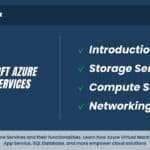SQL Database: Powering Data-Driven Applications with Relational Excellence SQL Database: Powering Data-Driven Applications with Relational Excellence
Introduction
In today’s data-centric world, businesses rely on robust and efficient database management systems to store, organize, and retrieve their valuable data. Structured Query Language (SQL) databases have long been a cornerstone of data management, providing a reliable and standardized approach to working with structured data. In this blog post, we will explore the fundamentals of SQL databases, understand their key features and benefits, and delve into the reasons why they remain a popular choice for businesses worldwide.
Understanding SQL databases
SQL databases are relational database management systems (RDBMS) that use the SQL language to interact with and manage structured data. These databases store information in tables, which consist of rows and columns, and use predefined schemas to define the structure and relationships between the data. SQL databases offer a powerful and flexible solution for storing and retrieving structured data, making them well-suited for a wide range of applications.
Learn Azure from the top Industry experts! Join Kloud Course Academy’s Azure Training and Certification Course now.
Key Features and Benefits
- Data Integrity: SQL databases enforce data integrity through the use of constraints, such as primary keys, foreign keys, and unique constraints. These constraints ensure that the data stored in the database remains consistent and accurate, preventing inconsistencies and errors.
- Relational Structure: SQL databases excel at managing relationships between different data entities. By using tables and defining relationships through keys, SQL databases allow for efficient querying and retrieval of related data. This relational structure enables complex data modelling and supports normalization principles, leading to optimized data organization.
- ACID Compliance: ACID (Atomicity, Consistency, Isolation, Durability) is a set of properties that guarantee reliable and transactional data operations. SQL databases adhere to ACID principles, ensuring that database transactions are executed reliably and consistently, even in the presence of concurrent operations or system failures.
- Scalability: SQL databases provide scalable solutions for handling growing data volumes and increasing user demands. With the ability to scale vertically (increasing the hardware resources of a single server) or horizontally (distributing the database across multiple servers), SQL databases can handle high traffic and large datasets effectively.
- Data Security: SQL databases offer robust security features to protect sensitive data. User authentication and access control mechanisms allow administrators to define fine-grained permissions and restrict unauthorized access. Additionally, SQL databases support the encryption of data at rest and in transit, ensuring data confidentiality.
Use Cases for SQL Databases
- Transactional Applications: SQL databases are widely used in transactional applications that require reliable and consistent data operations. Banking systems, e-commerce platforms, and inventory management systems heavily rely on SQL databases to handle complex transactions and maintain data integrity.
- Business Intelligence and Analytics: SQL databases play a crucial role in data analysis and reporting. With their ability to efficiently store and retrieve structured data, SQL databases serve as the foundation for business intelligence and analytics platforms. By leveraging SQL queries and aggregations, businesses can extract insights, perform data-driven decision-making, and generate reports.
- Content Management Systems (CMS): SQL databases are commonly used in CMS platforms to manage content, user profiles, and metadata. The relational structure of SQL databases allows for efficient storage and retrieval of diverse content types, such as articles, images, and user-generated data, enabling seamless content management and delivery.
- Backend Systems for Web Applications: SQL databases are a popular choice for backend systems in web applications. Whether it’s storing user data, managing product catalogues, or handling session information, SQL databases provide the necessary reliability and scalability to support web application frameworks.
Conclusion
SQL databases continue to be a powerful and reliable solution for managing structured data in various applications. Their relational structure, data integrity features, ACID compliance, and scalability make them a versatile choice for businesses of all sizes. Whether you are building transactional systems, analysing data, or managing content, SQL databases offer the flexibility, performance, and security needed to drive your data-driven applications forward. By harnessing the capabilities of SQL databases, businesses can effectively organize, access, and utilize their structured data to unlock insights, enhance decision-making, and achieve their goals in the data-driven era.
Frequently Asked Questions about SQL Database
SQL is used to communicate with a database.
DDL (Data Definition Language) commands, DML (Data Manipulation Language) commands, and DCL (Data Control Language) commands.
SQL is a query programming language designed to manage relational databases. MySQL is a relational database management system using SQL. SQL is primarily used for querying and operating database systems. MySQL allows you to handle, store, modify, and delete data while keeping it organized.
One of the most popular SQL query tools is Microsoft SQL Server Management Studio (SSMS).
Structured query language (SQL) is a programming language for storing and processing information in a relational database.
SQL stands for Structured Query Language. SQL commands are instructions for communicating with a database in order to perform data-related tasks, functions, and queries.
On its own, SQL isn’t hard to learn.
- DDL (Data Definition Language)
- DML (Data Manipulation Language)
- DQL/DRL (Data Query Language)
- DCL (Data Control Language)
- TCL (Transaction Control Language)
SQL queries can retrieve and manipulate significant amounts of Excel data more efficiently.
- Multi-Platform Desktop Application For Querying, Editing, Browsing, And Managing Databases.
- dbForge Studio for PostgreSQL.
- DataGrip.
- Altova DatabaseSpy. IDE with a clean design, that allows you to create charts based on the query results.













